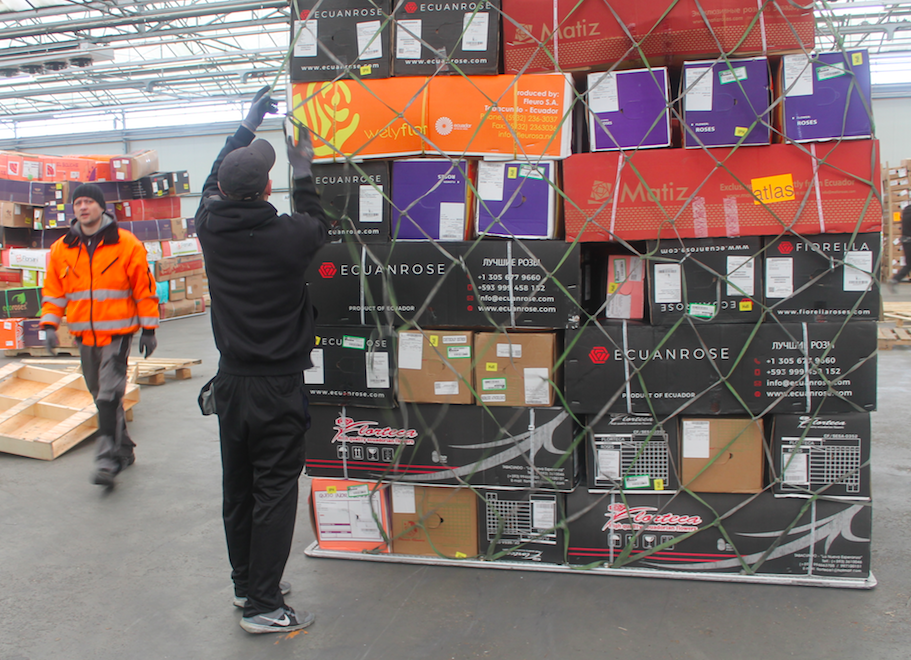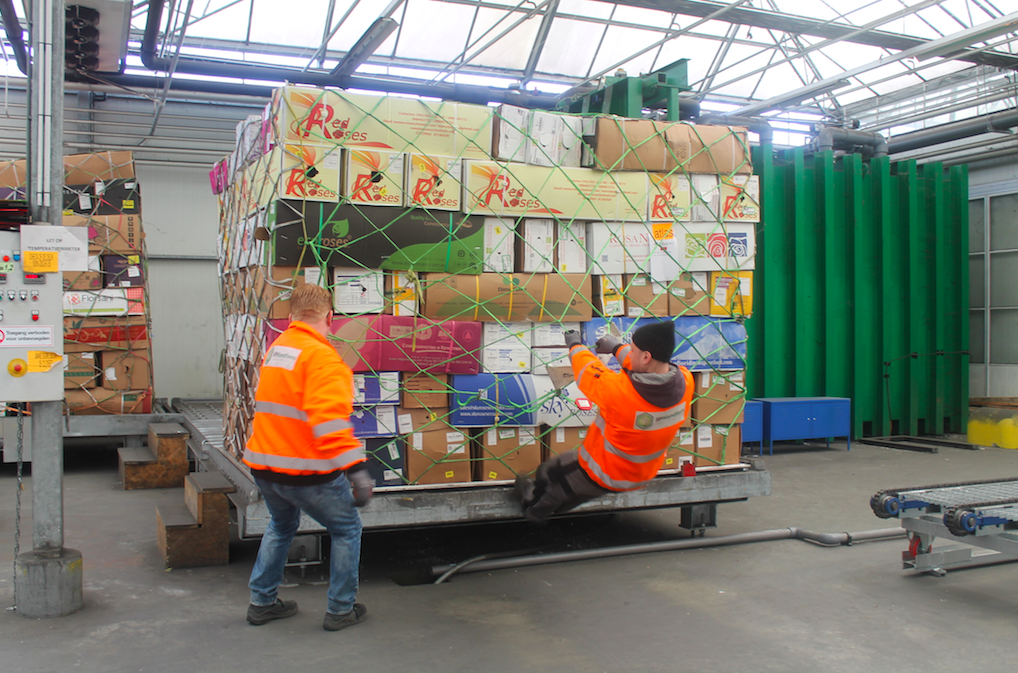The Netherlands is an important pivot in the international flower trade. Large quantities of flowers from Africa, South America and Israel are shipped to Amsterdam for further distribution throughout the world. IPHandlers in Aalsmeer is one of the largest fresh produce handling companies. Lorries are coming and going 24 hours per day, transporting mostly flowers. “We are going to focus more on the Dutch market”, says director Mark Loos.
Mark Loos, director of IPHandlers, gives us a tour of the company and at some stage he points at a digital planning board that hangs on the wall in the office. It gives an overview of all the incoming flights, their (expected) arrival times and the number of boxes going to IPHandlers. It also lists a few shipping containers. Because every now and again, a load of dendrobium from China or sansevieria from Central America arrives in Aalsmeer.

It’s clear from the planning board that a large number of flights with freight for IPHandlers arrives in Amsterdam every day. Today alone, they’re waiting for ten KLM planes to arrive. This includes a few cargo planes as well as some passenger aircrafts that transport flowers in their cargo hold.
“We work 24 hours per day, seven days per week. By the end of this year, we’ll have handled a total of 75 million kg”, says Mark. The director explains that 90% of this volume consists of flowers. The remaining 10% consists of fruit, vegetables and a few containers of plants.
Major refurbishment
All flowers arriving at Schiphol are distributed across the various handlers by handling agents like Swissport, Dnata and Menzies, explains Mark Loos. IPH collects the boxes of flowers from the airport with their own lorries. All boxes are checked by customs in Aalsmeer.
IPHandlers’ huge warehouse and various cold stores are humming with activity. The flowers, which might have warmed up during transport, are moved to one of the vacuum coolers, where their temperature is brought back to 2°C, says Mark. This process takes 20 to 25 minutes. Meanwhile, in the warehouse, workers are sorting the large stacks of boxes by customer number. Forklifts are driving back and forth, moving boxes to the cold stores, where they’re arranged by destination place.
IPH’s main hall is currently undergoing a major refurbishment. A new roof, with cooling panels, is being installed. As a result, the capacity of cold storage will increase by 40%. Extra cold store rooms and a new phytosanitary space have already been built during an earlier phase.

Mark Loos takes us through to an area behind a ‘curtain’. He shows us their new vacuum cooler, freshly painted, ready to be used. He explains that they’re expanding their electrics and cooling facilities, allowing four vacuum coolers to run at the same time.
Up until now, they could only have two vacuum coolers running simultaneously. “This will give us sufficient capacity for growth”, says Mark. Cooling flowers back down increases their shelf life. Which is good, as many of these flowers will be spending another four or five days in a lorry to Russia.
Russia day
Today is Russia day, says Mark when we’re in the cold store. That means that most of the flowers in the cold store will be leaving the premises in a lorry going eastward, within 24 hours after a spot check and arrangement of all customs documents. It also means that most of the flowers that arrive today are from South America. Ecuador and Colombia are important suppliers for the Russian market. “It happens that 4,300 out of the 4,500 boxes of flowers on a plane from Ecuador go to us”, says Mark. He has noticed that more and more African flowers are shipped to Russia too, because of the improved quality as well as the growth of the Russian middle class.
On the weekends, IPHandlers processes a lot of flowers for Western Europe. But Russia is their most important market by far. 70% of the flowers are forwarded to this immense country. 30% goes to countries like Germany, France, Sweden, Italy and England. That’s just the way things developed. Earlier this year, IPH’s Russian customer base increased even further, when a competitor pulled out of the Russian market.
Boycott
This strong dependence on the Russian market does make IPHandlers vulnerable, though. IPH felt it not too long ago, when the Russians decided to boycott Dutch fruit and vegetables. Luckily, the damage wasn’t too bad, as the volume of fruit and vegetables that IPH forwards to Russia isn’t great. Later on, during the rouble crisis, the effects were more noticeable. “Every cent was fought for at that time. But luckily, that didn’t last long”, according to Mark. When the exchange rate of the rouble stabilised, trade with Russia stabilised again as well.

Another threat emerged recently, though. AirBridge, the cargo airline that transports a lot of produce between Amsterdam, Russia and Kazakhstan, lost some of their Schiphol time slots and there was talk that perhaps they would have to fly to and from Liège instead. Getting the South American flowers to Belgium on time would have been difficult for IPHandlers. In the end, after Russian threats that they would close their airspace for KLM, KLM gave a few of their time slots to AirBridge. In an attempt to reduce dependency on Russia, IPHandlers is currently trying to spread their risk. “We’re trying to bring the ratio Russia – Western Europe to 50% – 50%”, says Mark.
Dutch market
IPHandlers isn’t very active on the Dutch market yet. They want to focus on that more in the coming year. “Flowers and cuttings fit in well with our strategy of qualitative growth. We’re adapting to the changing market; it’s a more intricate network that needs to be served these days. We’re switching to a new logistics software package and we’re introducing an improved tracking system. All customer details will immediately be visible in the MyIPH app”, says Mark.
According to Mark, the biggest threat for his company is the fact that Schiphol is reaching its maximum capacity. More and more planes transporting flowers might have to land outside the Netherlands in the near future.
But for now, IPHandlers is growing every year. They’re hoping to reach a volume of 75 million kg this year. The increase is the result of the acquisition of competitors’ customers as well as the growth of the global market for flowers. IPHandlers’ aim is to continue to grow over the next couple of years.
Mark: “We’re a flat organisation and we’re healthy. We’ve got a great team of employees, 85 permanent staff and 35 temporary workers. They’ve got 12 different nationalities and they have all embraced our company spirit. That’s what makes our work so special. We’ve been making a profit each year. The money that we earn is immediately invested, which creates further opportunities for growth.”









